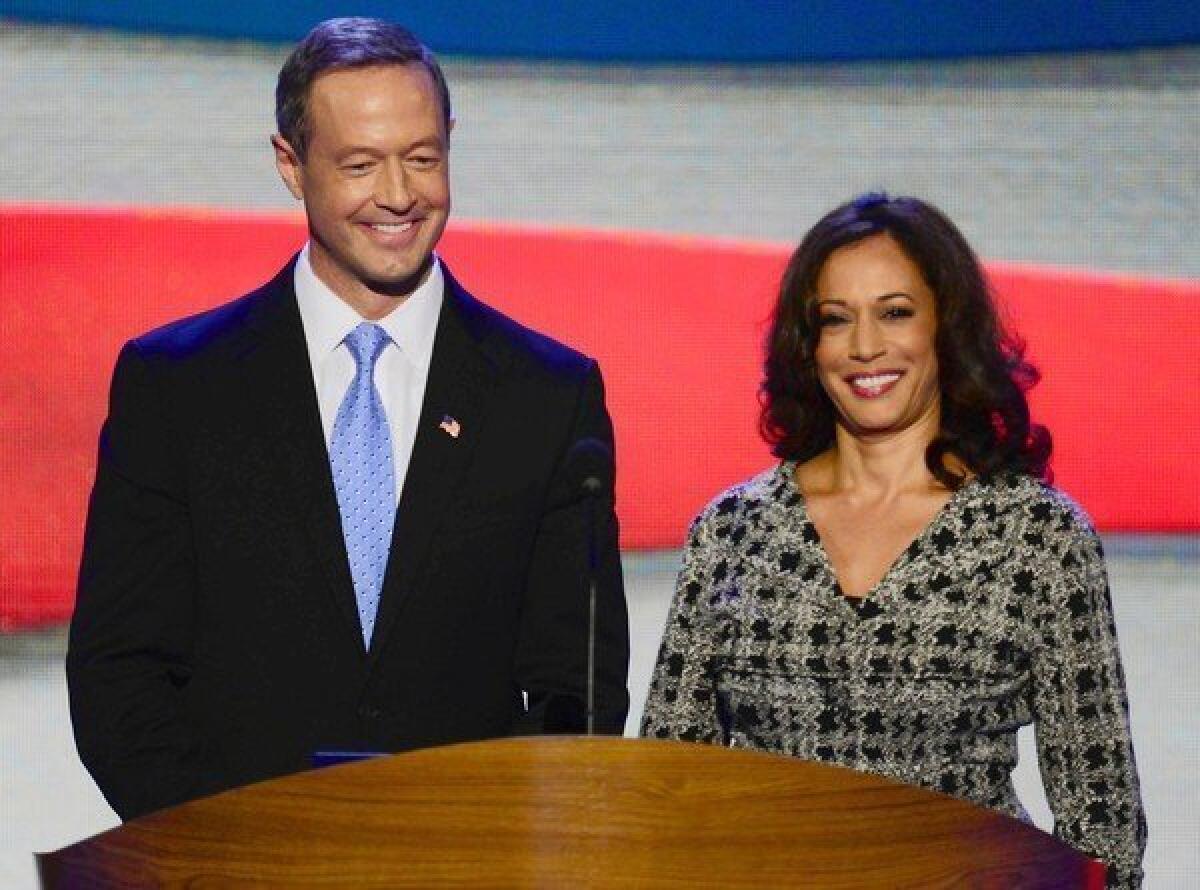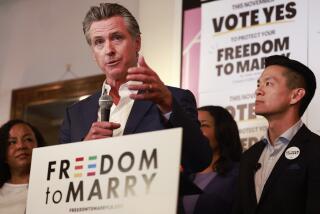After Obama, who? Democrats check their bench

- Share via
CHARLOTTE, N.C. — Zipping around Charlotte this week, Martin O’Malley has the air of a runner seeking a head start in a race where his competitors aren’t even in the starting gates.
Maryland’s governor seems to be everywhere at the Democratic National Convention. He has delegation breakfasts, panel discussions and network interviews in a packed schedule that also includes a role in the opening of the convention Tuesday night, and then a prime-time speech from the podium. After that: a jam session with O’Malley’s March, his Irish rock band.
As chairman of the Democratic Governors Assn., O’Malley insists his focus is narrow: to help reelect President Obama and sustain, if not increase, the party’s numbers in statehouses. But he’s also keenly aware of something the president has reminded audiences often of late — that win or lose, this is his last election.
PHOTOS: Scenes from the Democratic National Convention
O’Malley’s frenetic, look-over-here approach stands in contrast to that of at least one other possible contender: New York Gov. Andrew Cuomo.
Despite sky-high approval ratings less than two years into his first term, and the national megaphone available to the leader of the Empire State, Cuomo has conspicuously abstained from joining the fray. He’ll come to Charlotte on Thursday, the last day of the convention, to hear Obama accept his party’s nomination for a second term.
Asked why he was making himself scarce, Cuomo recently told the Albany press corps: “Because I am governor of the state of New York, and I have a lot to do as the governor of the state of New York.”
Even further from Charlotte this week is the name mentioned most often as a nominee-in-waiting, should she want it: Hillary Rodham Clinton.
PHOTOS: Protests of the Democratic National Convention
Her role as secretary of State precludes her from any politicking, and her current six-nation swing through the Asia-Pacific region, which saw her land Tuesday in Beijing, seemed staged to emphasize her nonpartisan status.
Her biggest potential booster, former President Clinton, has a prominent role here instead. He will submit Obama’s name for renomination and headline the Wednesday speaking program. He’s spent much of the last four years making good on his wife’s political debts, supporting those Democrats who backed her over Obama in the 2008 primaries.
Aides to Vice President Joe Biden are sure to say he hasn’t ruled out a third bid for the presidency, while emphasizing that his sole priority at the moment is helping Obama win another term.
The 2016 conversation, such as it is already engaged, begins with Clinton and Biden, said Andy Stern, former head of the Service Employees International Union, a key Democratic cog.
“Their absence would make it a lot more attractive for other people,” Stern said.
The Democratic bench may not be as apparent as the Republican wannabes on display at their convention in Tampa, Fla. Democrats reached to the ranks of mayors for a keynote speaker. Another prime slot was awarded to Elizabeth Warren, running for the Senate in Massachusetts. A victory would propel her into the 2016 ranks, much in the way it did Obama.
But it is O’Malley, more than most, who is keeping his options open.
Talk of a possible presidential run is “at once flattering, encouraging, annoying and not helpful,” he said in an interview this year. After arriving in Charlotte, he told reporters who raised the subject that this week is “not a time to tell the Martin O’Malley story, this is the time to tell the Barack Obama story.”
But this year the governor has emerged as one of the most prominent elected Democrats tasked with making the president’s case in the press, breaking into the tight circle that the Obama campaign has come to trust to stay on message.
“Somebody introduced me the other day as a lead surrogate for President Obama. I suppose I am, by merit of being chairman of the DGA,” O’Malley said in July. “I’m glad to be. I think that we as a party are finding a much clearer voice in this race and drawing a much clearer contrast than we were certainly a year or two ago.”
His ubiquity has its risks. On one of two TV talk shows he did Sunday, O’Malley was tripped up by the standard question for an incumbent party: Are Americans better off now than they were four years ago?
“No, but that’s not the question of this election,” was his answer.
Republicans just heard “No,” and included O’Malley in their press offensive on the subject. The Obama campaign, caught off guard, scrambled Monday and insisted that Americans were “absolutely” better off than in the months before Obama was elected, when the economy was going off a cliff.
Because he was elected only in 2010, Cuomo “is being very wise” to pursue a different, less public path than O’Malley, Stern said. Reviving his state’s sluggish economy “will say more about his record than almost anything else he can do.”
More to Read
Sign up for Essential California
The most important California stories and recommendations in your inbox every morning.
You may occasionally receive promotional content from the Los Angeles Times.











